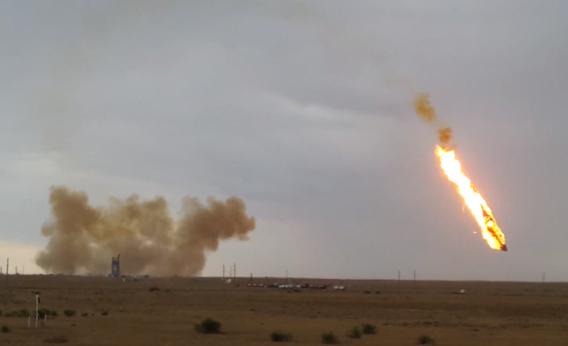Create a free profile to get unlimited access to exclusive videos, sweepstakes, and more!
Russian Rocket Crashes and Explodes After Takeoff

Early Tuesday morning local time, at 02:38 UTC on July 2, an uncrewed Russian Proton M rocket crashed and exploded just seconds after takeoff from the Baikonur Cosmodrome, a spaceport in Kazakhstan. Thereâs pretty dramatic footage of it online:
Thereâs been no official statement about what caused the failure. The rocket starts to wobble almost immediately after launch, losing stabilization. It pitches over, and the upper section of the rocket comes off, most likely due to aerodynamic stress; that part is not designed to withstand a fierce sideways wind. Moments later, the entire rocket crashes to the ground and explodes.
An even more dramatic video was taken by witnesses nearby:
From the sound delay after impact, Iâd estimate they were about 3 kilometers (2 miles) from the site.
The rocket was carrying three navigation satellites called GLONASS, similar to GPS satellites. These were upgrades to the currently operating fleet of satellites that have been in place for a few years now.
I havenât heard any reports of injuries from the explosion. Also, Iâll note this rocket is scheduled to launch a research module and another robotic arm to the International Space Station later in 2013. Itâs not clear how this failure will affect those launches. Iâll update this as I find out more about the cause and ramifications of the malfunction.
[UPDATE (July 2, 2013 at 22:00 UTC (edited July 4; see correction below)): Roscosmos, the Russian space agency, has not yet released an official explanation of what happened. When I hear more I will update this post.]
[Corrections (added July 4, 2013 at 20:45): Please note some corrections in the above article. I had originally mentioned a dark plume from an engine that looked suspicious. That turns out to be normal and unlikely to be related to the accident; you can see it in earlier, successful launches. Also, in the update above I had originally linked to what I thought was the Facebook page of the Russian space agency Roscosmos, but it is in fact a fan page, not an official page. I have removed the links, and I apologize for any confusion. My thanks to Ben Cooper for pointing these out to me.]
Tip oâ the nose cone to BABloggee Doug Troy, David Harland, and RadarDude on Twitter.


























